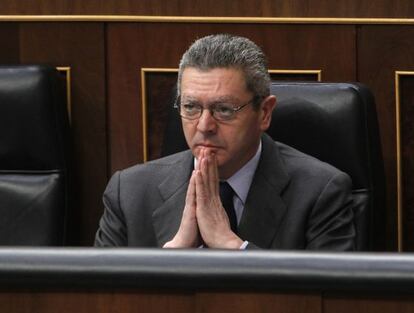Justice Ministry changes tack on election of CGPJ members
Government performs U-Turn after expenses scandal


The long-drawn-out departure of Carlos Dívar — who was found to have dipped into the judiciary's coffers during private trips — from the presidency of the General Council of the Judiciary (CGPJ), Spain's highest legal body, has sparked greater consequences. The government now appears willing to step back from its previous position of promoting the election of members of the CGPJ by judges and move back to an arrangement in which Congress holds sway.
The Justice Ministry confirmed the government's change of tack in a document sent to the new head of the CGPJ, Gonzalo Moliner, which was well-received by the judge and the opposition Socialist Party, which backs the current system.
In its electoral campaign the Popular Party proposed that 12 members of the CGPJ would be elected among judges and magistrates themselves, with the remaining eight elected by parliament, ensuring an almost permanent majority of conservatives in the top echelon of the judiciary.
Tu suscripción se está usando en otro dispositivo
¿Quieres añadir otro usuario a tu suscripción?
Si continúas leyendo en este dispositivo, no se podrá leer en el otro.
FlechaTu suscripción se está usando en otro dispositivo y solo puedes acceder a EL PAÍS desde un dispositivo a la vez.
Si quieres compartir tu cuenta, cambia tu suscripción a la modalidad Premium, así podrás añadir otro usuario. Cada uno accederá con su propia cuenta de email, lo que os permitirá personalizar vuestra experiencia en EL PAÍS.
¿Tienes una suscripción de empresa? Accede aquí para contratar más cuentas.
En el caso de no saber quién está usando tu cuenta, te recomendamos cambiar tu contraseña aquí.
Si decides continuar compartiendo tu cuenta, este mensaje se mostrará en tu dispositivo y en el de la otra persona que está usando tu cuenta de forma indefinida, afectando a tu experiencia de lectura. Puedes consultar aquí los términos y condiciones de la suscripción digital.








































